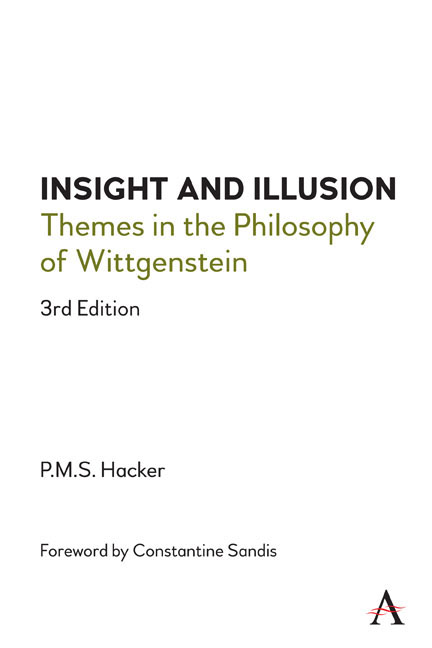Book contents
- Frontmatter
- Dedication
- Contents
- FOREWORD
- PREFACE TO THE REVISED EDITION
- PREFACE TO THE FIRST EDITION
- LIST OF ABBREVIATIONS
- I WITTGENSTEIN’S EARLY CONCEPTION OF PHILOSOPHY
- II THE DIALOGUE WITH FREGE AND RUSSELL
- III MEANING, METAPHYSICS, AND THE MIND
- IV EMPIRICAL REALISM AND TRANSCENDENTAL SOLIPSISM
- V DISINTEGRATION AND RECONSTRUCTION
- VI WITTGENSTEIN’S LATER CONCEPTION OF PHILOSOPHY
- VII METAPHYSICS AS THE SHADOW OF GRAMMAR
- VIII THE REFUTATION OF SOLIPSISM
- IX PRIVATE LINGUISTS AND PUBLIC SPEAKERS
- X ‘A CLOUD OF PHILOSOPHY CONDENSED INTO A DROP OF GRAMMAR’
- XI CRITERIA, REALISM AND ANTI-REALISM
- INDEX
II - THE DIALOGUE WITH FREGE AND RUSSELL
Published online by Cambridge University Press: 24 February 2022
- Frontmatter
- Dedication
- Contents
- FOREWORD
- PREFACE TO THE REVISED EDITION
- PREFACE TO THE FIRST EDITION
- LIST OF ABBREVIATIONS
- I WITTGENSTEIN’S EARLY CONCEPTION OF PHILOSOPHY
- II THE DIALOGUE WITH FREGE AND RUSSELL
- III MEANING, METAPHYSICS, AND THE MIND
- IV EMPIRICAL REALISM AND TRANSCENDENTAL SOLIPSISM
- V DISINTEGRATION AND RECONSTRUCTION
- VI WITTGENSTEIN’S LATER CONCEPTION OF PHILOSOPHY
- VII METAPHYSICS AS THE SHADOW OF GRAMMAR
- VIII THE REFUTATION OF SOLIPSISM
- IX PRIVATE LINGUISTS AND PUBLIC SPEAKERS
- X ‘A CLOUD OF PHILOSOPHY CONDENSED INTO A DROP OF GRAMMAR’
- XI CRITERIA, REALISM AND ANTI-REALISM
- INDEX
Summary
Agreements and Disagreements
The Tractatusis, inter alia,a dialogue with Frege and Russell, a dialogue in which, to a large extent, the voices of the two initiators are supposed to be familiar to the reader. Difficult to understand at best, it is quite impossible to follow without a grasp of the positions against which Wittgenstein was, often implicitly, arguing. Problems are compounded by three further factors. First, one must identify Wittgenstein's specific targets. Sometimes diey are to be found in Frege's Begriffsschrift,sometimes in The Basic Laws of Arithmeticor in his articles. In Russell's case Wittgenstein was not only criticizing the views propounded in The Principles of Mathematics, Principia Mathematica,and Our Knowledge of the External World,but often also views Russell never published and which only publicly came to light with the posthumous publication in 1984 of the suppressed 1913 manuscript entitled Theory of Knowledge.Secondly, one must beware of reading modern conceptions into these works. Though familiar technical terms such as ‘function', ‘truth-function', ‘truth-condition', ‘logical constant', ‘form’ occur in the writings of Frege, Russell, and the Tractatus,it must not be presumed that they are used in the same way or understood in the same manner as they are now. Otherwise one will misconstrue Wittgenstein's targets and misunderstand his criticisms. Thirdly, it is not enough to clarify how Frege and Russell used and construed their terms of art; one must make clear, when necessary, whether Wittgenstein, in criticizing them, interpreted them as they intended. An exhaustive record of this dialogue would pay rich dividends in terms of I shall merely sketch some of the main theories and outline some of the central arguments.
Wittgenstein sided with Frege against psychologism in logic. Logical analysis is wholly independent of introspective psychology. Analysis of mental processes of thought and association, investigation into the empirical nature of human understanding, explanations of our modes of acquisition of concepts in learning-theory all belong to psychology and are irrelevant to logic (TLP,4.1121). Accordingly, like Frege, Wittgenstein brushed aside as irrelevant to logic a host of questions concerning the nature of understanding.
- Type
- Chapter
- Information
- Insight and IllusionThemes in the Philosophy of Wittgenstein, pp. 28 - 55Publisher: Anthem PressPrint publication year: 2021



